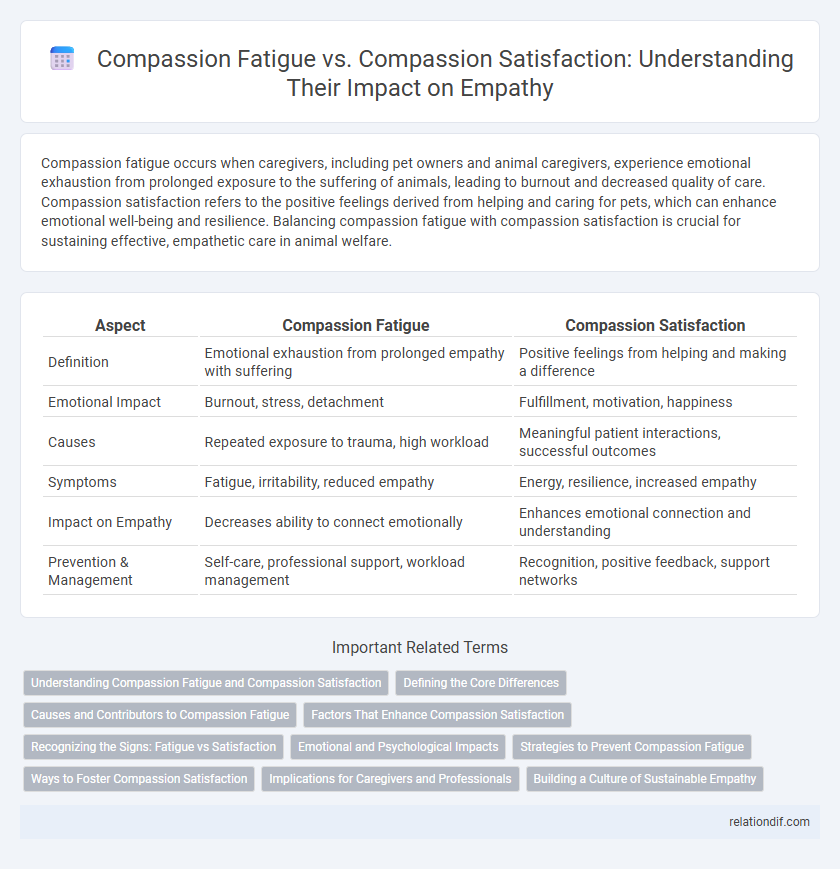Compassion fatigue occurs when caregivers, including pet owners and animal caregivers, experience emotional exhaustion from prolonged exposure to the suffering of animals, leading to burnout and decreased quality of care. Compassion satisfaction refers to the positive feelings derived from helping and caring for pets, which can enhance emotional well-being and resilience. Balancing compassion fatigue with compassion satisfaction is crucial for sustaining effective, empathetic care in animal welfare.
Table of Comparison
| Aspect | Compassion Fatigue | Compassion Satisfaction |
|---|---|---|
| Definition | Emotional exhaustion from prolonged empathy with suffering | Positive feelings from helping and making a difference |
| Emotional Impact | Burnout, stress, detachment | Fulfillment, motivation, happiness |
| Causes | Repeated exposure to trauma, high workload | Meaningful patient interactions, successful outcomes |
| Symptoms | Fatigue, irritability, reduced empathy | Energy, resilience, increased empathy |
| Impact on Empathy | Decreases ability to connect emotionally | Enhances emotional connection and understanding |
| Prevention & Management | Self-care, professional support, workload management | Recognition, positive feedback, support networks |
Understanding Compassion Fatigue and Compassion Satisfaction
Compassion fatigue arises from prolonged exposure to others' suffering, leading to emotional exhaustion and reduced empathy, while compassion satisfaction reflects the positive feelings derived from helping and making a difference. Recognizing the signs of compassion fatigue, such as irritability and withdrawal, enables caregivers to implement self-care strategies that restore emotional balance. Fostering compassion satisfaction through meaningful connections and personal growth enhances resilience and sustains long-term caregiving motivation.
Defining the Core Differences
Compassion fatigue is characterized by emotional exhaustion and reduced capacity to empathize due to prolonged exposure to others' suffering, often leading to burnout in caregiving professions. In contrast, compassion satisfaction refers to the positive feelings derived from helping others, including fulfillment and a sense of purpose that can enhance resilience and job satisfaction. Understanding these core differences highlights the balance between the risks of emotional depletion and the rewards of meaningful caregiving.
Causes and Contributors to Compassion Fatigue
Compassion fatigue arises primarily from prolonged exposure to the suffering of others, leading to emotional exhaustion and reduced empathy. Key contributors include high workloads, lack of social support, and insufficient coping strategies in caregiving professions. Chronic stress and unresolved trauma further exacerbate the risk of developing compassion fatigue, diminishing overall well-being and job performance.
Factors That Enhance Compassion Satisfaction
Factors that enhance compassion satisfaction include strong social support networks, effective stress management techniques, and opportunities for professional growth and recognition. Regular self-care practices, such as mindfulness and balanced work-life integration, play a crucial role in maintaining emotional resilience. Access to training on empathy skills and organizational encouragement also significantly boost caregivers' positive feelings and job fulfillment.
Recognizing the Signs: Fatigue vs Satisfaction
Recognizing the signs of compassion fatigue involves identifying emotional exhaustion, decreased empathy, and feelings of helplessness, which contrast sharply with the positive indicators of compassion satisfaction such as increased fulfillment, resilience, and a sense of purpose. Healthcare professionals and caregivers often experience compassion fatigue through symptoms like irritability, reduced job performance, and detachment, whereas compassion satisfaction boosts motivation and strengthens emotional well-being. Monitoring these signs is crucial for maintaining mental health and fostering sustainable caregiving practices.
Emotional and Psychological Impacts
Compassion fatigue manifests through emotional exhaustion, reduced empathy, and increased feelings of helplessness often experienced by caregivers and healthcare professionals. In contrast, compassion satisfaction brings psychological rewards such as a sense of purpose, increased resilience, and positive emotional well-being despite exposure to suffering. Managing the balance between these states is crucial to maintaining mental health and sustaining empathetic care in high-stress environments.
Strategies to Prevent Compassion Fatigue
Implementing regular self-care routines, such as mindfulness practices and physical activity, significantly reduces the risk of compassion fatigue in caregiving professions. Establishing clear professional boundaries and seeking peer support through counseling or support groups fosters emotional resilience and maintains compassion satisfaction. Organizations should promote workload management and provide ongoing training on stress management techniques to sustain caregiver well-being.
Ways to Foster Compassion Satisfaction
Promoting self-care practices such as mindfulness, regular breaks, and adequate rest helps sustain compassion satisfaction among caregivers. Engaging in peer support groups and professional supervision fosters a sense of community and validation, enhancing emotional resilience. Creating a work environment that acknowledges accomplishments and provides opportunities for professional growth sustains motivation and job fulfillment.
Implications for Caregivers and Professionals
Compassion fatigue leads to emotional exhaustion and decreased empathy, negatively impacting caregivers' mental health and effectiveness in patient care. In contrast, compassion satisfaction enhances job fulfillment and resilience, promoting sustained motivation and well-being among healthcare professionals. Addressing these dynamics through targeted support programs is essential for maintaining caregiver performance and reducing burnout in clinical environments.
Building a Culture of Sustainable Empathy
Compassion fatigue results from prolonged exposure to others' suffering, leading to emotional exhaustion and reduced empathy, whereas compassion satisfaction arises from the fulfillment gained by helping others. Building a culture of sustainable empathy requires implementing supportive workplace practices, encouraging regular self-care, and fostering open communication to balance emotional demands. This approach enhances resilience, reduces burnout, and promotes long-term emotional well-being among caregivers.
compassion fatigue vs compassion satisfaction Infographic

 relationdif.com
relationdif.com